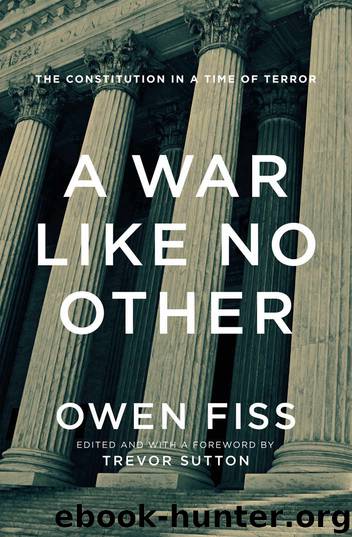A War Like No Other by Fiss Owen

Author:Fiss, Owen
Language: eng
Format: epub
ISBN: 978-1-6209-7098-0
Publisher: The New Press
Published: 2015-06-16T04:00:00+00:00
Prologue to Chapter 8
Trevor Sutton
Nearly all of the major legal controversies that arose out of the Bush and Obama administrations’ national security policies revolved around constitutional provisions that govern core functions of the criminal justice system, such as searches and seizures, executive detention, methods of interrogation, and procedural fairness in determinations affecting personal liberty. But the collateral effects of the War on Terror on our constitutional tradition have not been confined to these provisions. As the following essay demonstrates, the government’s efforts to eradicate extremism worldwide have had a corrosive effect on a constitutional right that might at first seem remote from counterterrorism policy: freedom of speech.
Unlike the other essays in this volume, this chapter, “Criminalizing Political Advocacy,” which was originally delivered as the Arlin M. and Neysa Adams Lecture in Constitutional Law at Temple University, focuses on one recent Supreme Court decision, Holder v. Humanitarian Law Project, and deals exclusively with First Amendment jurisprudence. But this narrow scope should not mislead the reader into thinking that the essay is thematically unlike the rest of the book. To the contrary, “Criminalizing Political Advocacy” offers a compelling case study of a theme that appears frequently in these pages: that war tends to corrode constitutional rights, and that long wars pose especially grave threats to those rights because their duration can turn aberrations into a new normal. The essay also offers a crisp illustration of how responsibility for such “debasement” (to use Fiss’s word) of the Constitution falls on all three branches, not simply on the executive.
On some level, it is far from surprising that the right to free speech should come under pressure during wartime. Divided nations rarely win wars, and speech that might seem benign during times of peace can take on the appearance of an existential threat at the onset of armed conflict. American history provides many examples of this tendency. In 1798, before the Bill of Rights was even a decade old, the Federalist Congress passed the Alien and Sedition Acts, which criminalized speech critical of the government as the nation prepared for war with France. This pattern repeated itself numerous times in the two centuries that followed, particularly during and in the immediate wake of the First World War, when the Supreme Court twice upheld enforcement of the Espionage Act of 1917 to prohibit leafleting. However, since the First World War, the Supreme Court has erected substantial barriers protecting free speech, even in the wartime context. As a consequence, free speech protections during the Vietnam War were especially robust, as the example of the Pentagon Papers case, New York Times v. United States, illustrates.
To date, the statute upheld in Holder v. Humanitarian Law Project is the only constraint on general advocacy of violence to survive a challenge since the 1969 decision in Brandenburg v. Ohio, which limited restrictions on speech in the name of public safety to situations where such speech was likely to incite or produce “imminent lawless action.” The statute in Humanitarian Law Project made
Download
This site does not store any files on its server. We only index and link to content provided by other sites. Please contact the content providers to delete copyright contents if any and email us, we'll remove relevant links or contents immediately.
Day by Elie Wiesel(2246)
The Age of Genius by A. C. Grayling(2175)
Gideon's Spies: The Secret History of the Mossad by Gordon Thomas(1953)
The Gulag Archipelago (Vintage Classics) by Aleksandr Solzhenitsyn(1729)
FATWA: Hunted in America by Pamela Geller(1724)
Columbine by Dave Cullen(1499)
Examples & Explanations: Administrative Law by William F. Funk & Richard H. Seamon(1328)
The Rule of Law by Bingham Tom(1319)
Men Explain Things to Me by Rebecca Solnit(1316)
Anatomy of Injustice by Raymond Bonner(1269)
Three Cups of Tea by Greg Mortenson(1261)
ADHD on Trial by Michael Gordon(1242)
That Every Man Be Armed by Stephen P. Halbrook(1240)
Gideon's Spies by Gordon Thomas(1218)
Palestinian Walks by Raja Shehadeh(1143)
The Source by James A. Michener(1135)
Fast Times in Palestine by Pamela Olson(1117)
Nothing to Envy by Barbara Demick(1042)
Constitutional Theory by Carl Schmitt(1037)
